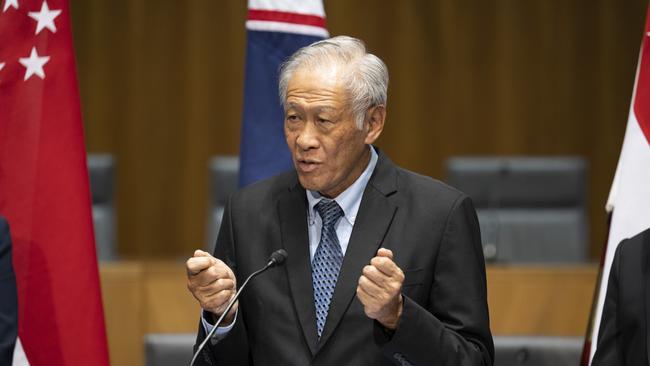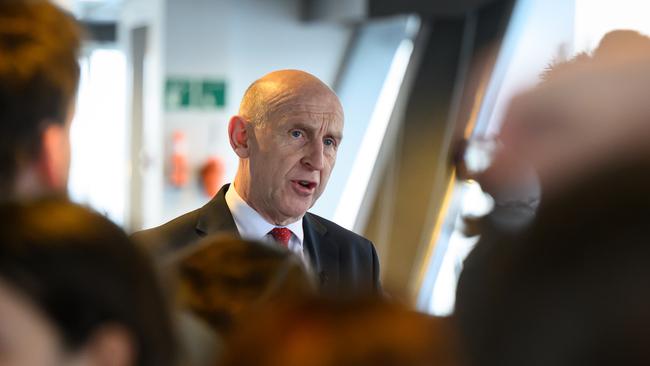Lesson one from Trump’s global shocks: look after your own backyard
The US retreat from its traditional role as underwriter of global security is forcing large and middle powers to pivot their security focus back to their own backyards.

With the rolling global shocks caused by the Trump administration’s dramatic redrawing of US foreign policy this week, it would have been easy to miss tiny Singapore’s scathing assessment of the US as a rent-seeking “disrupter”.
The comments from the usually circumspect Singaporean Defence Minister, Ng Eng Hen, reflect a broader regional concern that while Europe is currently in the crosshairs, Asia will be next.
Eng told a discussion at the Munich Security Conference last weekend that Asian perceptions of the US had shifted from that of a force of “moral legitimacy” to one more akin to “a landlord seeking rent”. “The image has changed from liberator to great disrupter to a landlord seeking rent,” he said soon after Donald Trump blindsided NATO allies by announcing plans to negotiate directly with Russian President Vladimir Putin over Ukraine.
Transactional Asia understands the language of the Trump administration in a way European nations may not. Many were ready with economic sweeteners ahead of Trump’s inauguration with pledges to buy more weapons, energy and US goods. Japan and The Philippines were among the fastest out of the blocks.
But US demands for Ukraine to hand over a stake in its critical minerals resources as payback for military assistance has raised questions over what price the Trump administration may put on its continued security guarantee in the Indo-Pacific.
Underpinning that growing regional anxiety is the biggest question of all; will Trump adopt a similarly transactional approach to China that he has with Russia?
“I think to some extent Singapore speaks for the region on this,” Lowy Institute Southeast Asia research fellow Rahman Yaacob said of Eng’s comments this week.
“Most Southeast Asian countries now consider the US can no longer guarantee stability.”
The US retreat from its traditional role as underwriter of global security is forcing a broader security refocus by both large and middle powers, who are quickly pivoting to their own backyards.
British Defence Minister John Healey best articulated the shift on Tuesday by declaring the UK would now focus on Europe and NATO as core security business, and that his country’s Indo-Pacific tilt “had been delivered”.

Britain would contribute to the balance of regional security in the Indo-Pacific, but “our first responsibility is in NATO”, he said.
The comments sparked immediate angst in Australia that the UK might ease back its commitments to the region and AUKUS, the trilateral security pact that aims to provide Australia with nuclear-powered submarines.
Australian Strategic Policy Institute security analyst Euan Graham says that was unlikely, given a French aircraft carrier was on its way to Darwin from military exercises in Southeast Asia, while Britain was to send its own aircraft carrier to the Australia-hosted multilateral Talisman Sabre defence exercises this year.
But, he cautioned: “There will be a need for more co-ordination between allies so we are not played off against each other and pushed into our hemispheric corners.
“The realisation that that helps Putin, Xi and Trump is an important one. It will be an important battle and it’s not lost yet.”
Regional middle powers – Australia, Japan, South Korea and India – will certainly need to do more, and work more closely, to fill the gap left by the US.
Australia has steadily lifted engagement throughout the Asia-Pacific, signing new security pacts with The Philippines, Vietnam, Indonesia, Tuvalu and Nauru, and starting talks this week on a new security deal with Papua New Guinea. Japan signed a landmark reciprocal defence agreement with The Philippines last year, and has since provided Bangladesh with patrol ships and military training to Vietnam.
Still, says Graham: “The basic arithmetic is that China is so powerful that no coalition minus the US is going to be up to the cut. It’s not an alternative to the US alliance system but about increasing burden sharing.”
China’s recent firing of flares at an Australian maritime surveillance aircraft in the South China Sea and this week’s appearance of a Chinese flotilla off Australia’s east coast suggests Beijing too is drawing lessons from the seismic shifts in the global order.
Whether China hawks in the Trump administration can prevail in redirecting US security resources and focus to the Indo-Pacific from the Middle East and Europe “is a shoe that hasn’t yet dropped”.
“The clear consensus in Washington is that China is the long-term competitor the US needs to concentrate on,” Graham says.
“But everyone will be chilled by what’s happening with Ukraine.
“A leader who has shown greater leadership under fire than anyone else in the world is lambasted as a dictator. We are back to big powers carving up the map.”




To join the conversation, please log in. Don't have an account? Register
Join the conversation, you are commenting as Logout